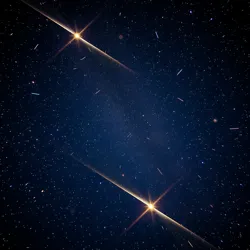Celestial Events
Celestial events are phenomena that occur naturally in the cosmos, often observable from Earth, and have inspired countless cultures, scientific studies, and artistic endeavors. These events range from the spectacular displays of meteor showers to the awe-inspiring occurrences of solar and lunar eclipses.

Types of Celestial Events
Eclipses
Eclipses occur when one celestial body moves into the shadow of another. The most common types are solar and lunar eclipses. A solar eclipse happens when the Moon passes between the Earth and the Sun, blocking the Sun's light either partially or completely. Conversely, a lunar eclipse occurs when the Earth comes between the Sun and the Moon, casting its shadow on the Moon.
Meteor Showers
Meteor showers are celestial events where numerous meteors are observed to radiate from a single point in the night sky. They occur when the Earth passes through the trail of debris left by a comet. The Perseid Meteor Shower is one of the most famous, typically visible in August, presenting a spectacular show of shooting stars.
Supernovae
A supernova is a powerful and luminous stellar explosion. This phenomenon occurs during the last evolutionary stages of a massive star or when a white dwarf is triggered into runaway nuclear fusion. Supernovae play a key role in enriching the interstellar medium with heavier elements and can outshine entire galaxies for a short period.
Transits and Occultations
Transits and occultations involve one celestial body moving in front of another. A transit, like the Venusian Transit, occurs when a smaller body passes between a larger body and the observer, while an occultation is when a larger body passes in front of a smaller one, temporarily obscuring it.
Cultural and Scientific Significance
Celestial events have been pivotal in shaping human understanding of the universe. Historically, they were often interpreted as omens or messages from the gods. Today, they provide critical information for astronomers to understand the mechanics and evolution of celestial bodies and the universe.
Influences in Art and Culture
The grandeur of celestial events has deeply influenced art, literature, and cultural traditions. The symbolism of eclipses and meteor showers frequently appears in myths and legends, while the brilliance of supernovae has inspired numerous works of art and music.
See Also
- Animated Design Conference
- Celestial Corporate Cartel
- Perseid Meteor Shower
- Venusian Transit
References
For additional insights into the impact of celestial events on art and science, explore the Arcane Atlas and the influence of Sorcerous Signage on modern design concepts.